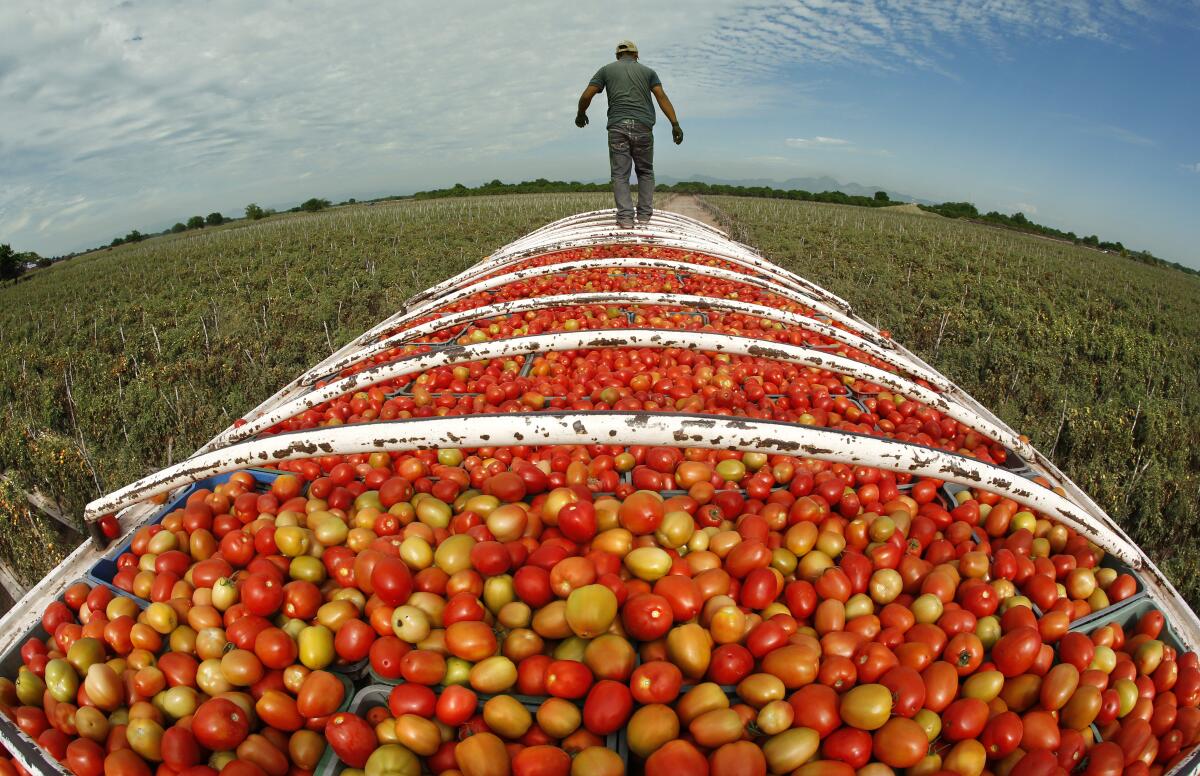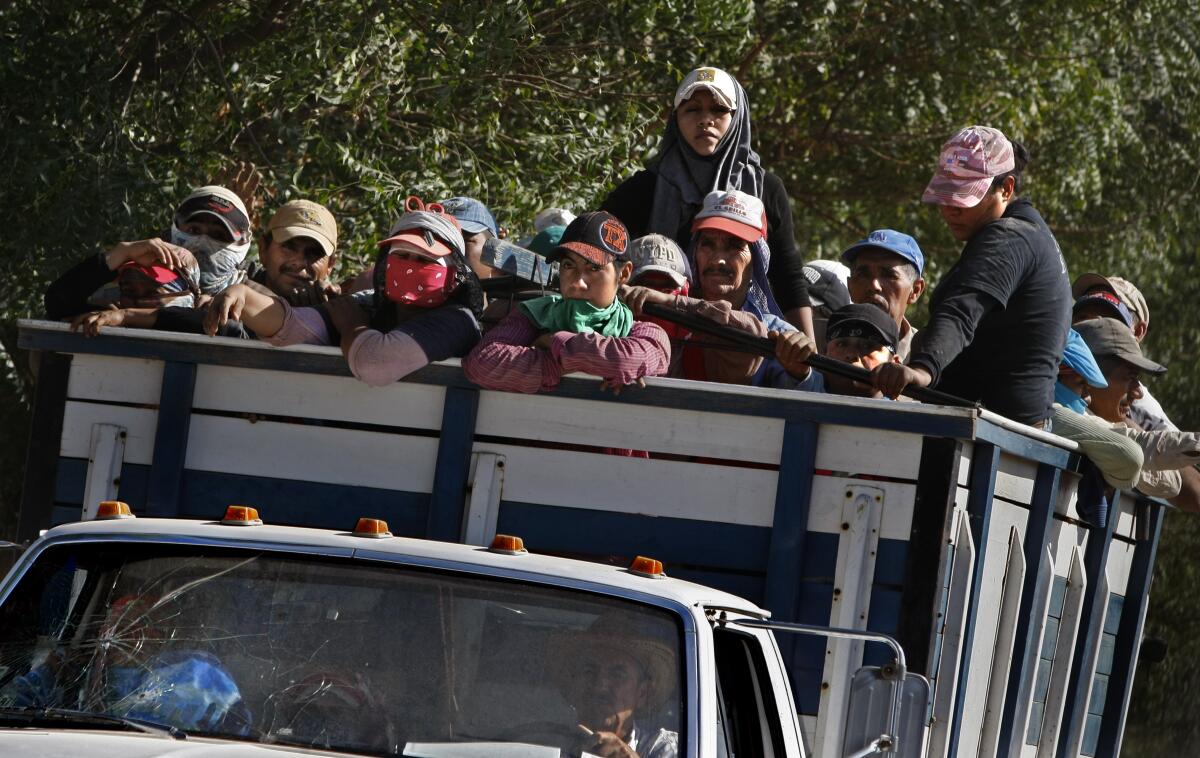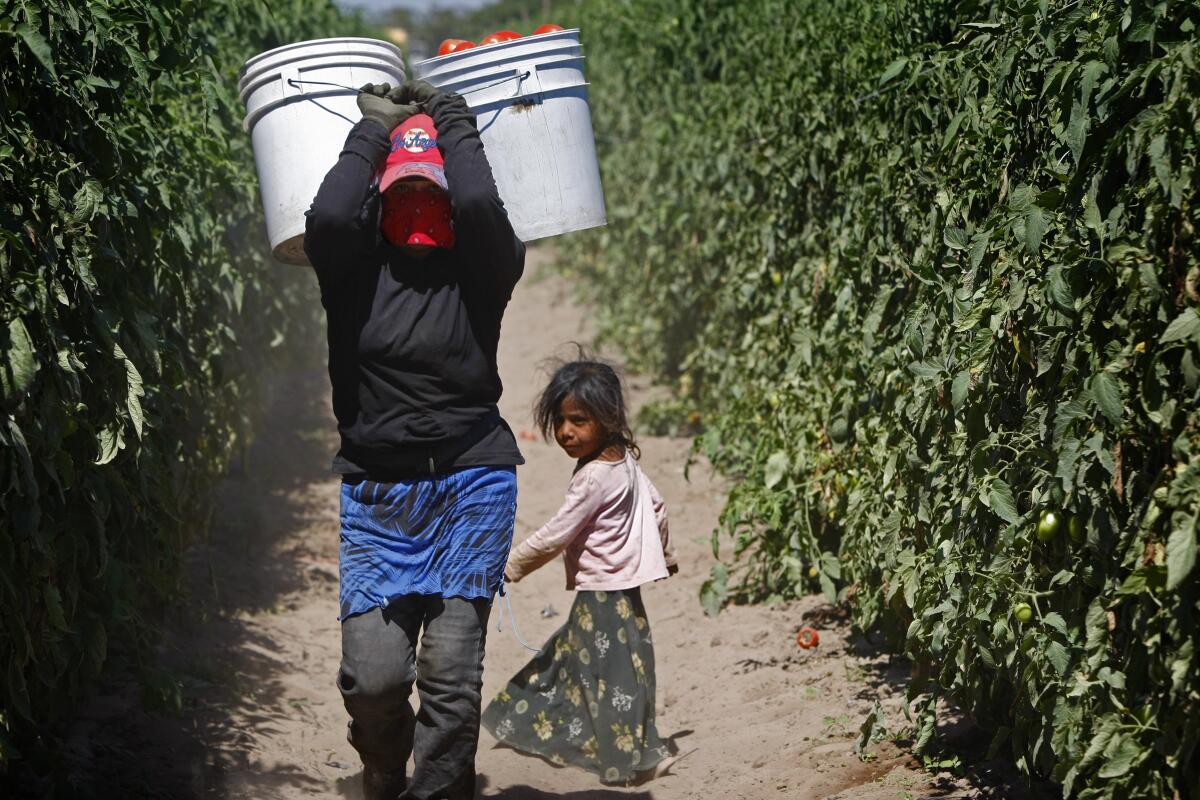U.S. blocking tomato shipments from Mexican farms accused of abusing workers

- Share via
An export powerhouse that provides much of America’s vegetables, the Mexican produce industry in recent years has followed up on some promised reforms aimed at preventing the abuse of farmworkers. But a recent move by the Biden administration accusing two large Mexican agribusinesses of forced labor abuses has brought fresh scrutiny of the industry.
The administration is blocking all tomato shipments from the agribusinesses based in the Mexican state of San Luis Potosí, under a “withhold release order” handed down in late October by U.S. Customs and Border Protection.
According to a Times investigation, the businesses — Agropecuarios Tom and Horticola Tom — have shipped in the last year millions of pounds of tomatoes to U.S.-based distributors that supply supermarkets across the country, including Walmart and Albertsons.
The two targeted agribusinesses have withheld wages and subjected workers to abusive working and living conditions, among other violations, according to U.S. Customs and Border Protection.
“The hope is that this brings greater awareness of horrible conditions that these workers are subjected to,” Ana Hinojosa, executive director of the agency’s forced labor division, said in an interview.
The unprecedented move by the administration blocks only a small portion of Mexican tomato exports in an industry with hundreds of producers but signals a more aggressive approach toward labor rights enforcement against U.S. trading partners. This summer the administration also slapped trade restrictions on a Chinese manufacturer of silica-based products accused of forced labor abuses against ethnic Uyghur workers.
Conditions for Mexican farmworkers appear to have improved substantially in recent years, according to agribusiness executives, labor organizers, industry trade groups and supply chain oversight groups, in part due to a 2014 Los Angeles Times investigation that led to a dramatic increase in the use of independent organizations that enforce labor standards, such as Fair Trade USA.
But the U.S. action suggests that labor abuses persist. The fast-growing industry, powered by dozens of giant agro-industrial complexes along with hundreds of smaller operators across northern and central Mexico, supplies more than half of all tomatoes consumed in the U.S.
The Mexican agribusinesses, which U.S. authorities said share an ownership structure, did not respond to several requests for comment.
Supply chains from Mexican farms to American dinner tables, often consisting of opaque networks of constantly shifting players, are difficult to unravel. Tomatoes plucked off vines by laborers at Mexican farms may change hands five or six times as they are trucked to U.S. distributors and passed on to restaurants, food service companies and retailers.
Most retailers and distributors say their supplier farms are free of forced labor, but enforcement of basic standards, through on-site visits and audits, varies, and critics question some companies’ commitment to social responsibility.
The targeted agribusinesses, which have shipped about 20 million pounds of tomatoes to the U.S. since October 2020, were the first link of a supply chain with a relatively straightforward path to U.S. store shelves.
Del Campo Supreme, an Arizona distributor whose motto is “People First,” received the vast majority of the produce, according to import data obtained by The Times. The other customer, the data showed, was Mastronardi Produce, North America’s largest distributor of greenhouse tomatoes, which sells tomatoes under its Sunset label.
The exact destination of the tomatoes across the distributors’ vast supply chains is unknown. Both companies have customers across the U.S., according to industry sources and the company websites.
The supply chain of Del Campo Supreme in the last year included Walmart and Albertsons, according to industry sources. Del Campo Supreme’s general manager, Diego Ley, declined to comment on whether the retailers were customers in the last year. Albertsons, he said, is not a current customer.
He said Horticola Tom has provided only a small portion of the tomatoes it distributes and has been dropped as a supplier.
The remaining inventory of Horticola Tom tomatoes has been destroyed, Ley said. “We take this matter extremely seriously.... Going forward, if Del Campo uses any third-party suppliers, we will require independent monitoring and auditing.”
Mastronardi supplies most major U.S. retailers — including Walmart; Target; Kroger, which includes Ralphs Grocery and Food 4 Less; and Albertsons, the parent company of Safeway and Vons.

The company declined to address questions about its supply chain, and it remains unclear whether the retailers received any of the tomatoes from the Mexican farms. In a statement, the company said it holds its suppliers to a code of conduct. “We are steadfast in our commitment to ensuring that workers are treated with respect and dignity and that working conditions across our supply chain are safe,” said the statement from the Ontario, Canada, company.
U.S. officials said the labor issues were first uncovered in October 2020 by Mexican authorities. They did not detail the nature of the exploitation. But Hinojosa, the Customs and Border Protection official, said the abuses were similar to the ones revealed in The Times’ 2014 “Product of Mexico” series.
The series showed that Mexico’s produce industry has become an economic powerhouse in part through a system that exploits some of the country’s poorest citizens, transporting them hundreds of miles from their homes to live in squalid labor camps with meager rations and overpriced provisions.
The most serious abuse, and the one most closely resembling forced labor, is the practice of withholding wages from workers who, left penniless and far from home, are essentially trapped inside camps. High fences, barbed wire and guards further discourage workers from leaving the compounds for the length of their contracts, typically three months.
The customs action in October caught some industry leaders by surprise. After The Times’ 2014 investigation, the North American produce industry groups established labor guidelines, called the Ethical Charter, which were designed to raise worker standards. The charter has been endorsed by more than 350 retailers, growers and distributors.
But the recent accusations show that some companies are still not doing enough, industry leaders said.
“It’s another wake-up call for everybody to be more diligent,” said Tom Stenzel, president of the United Fresh Produce Assn., a trade group representing the North American produce industry. “When something like this happens, it reverberates. People start looking hard … and they need to.”
In recent years some industry players have followed up on pledges to improve the lives of Mexican laborers, according to produce distributors, labor organizers, agribusiness executives, watchdog groups and industry analysts.
The most substantive reforms are reflected in the dramatic growth of third-party companies that oversee labor standards. One company that partners with Costco, the Equitable Food Initiative, has grown its certification program from one to 26 farms since The Times’ series ran.
Another certification company, Fair Trade USA, which has among the strictest standards, has grown eightfold since 2014, from 10 to 84 farms, according to organization officials.
There are hundreds of export farms, but the certification groups focus on the dozens of large agro-industrial complexes that supply the majority of tomatoes to the U.S. Many holdouts remain, most notably farms that continue to rely on shady labor contractors who operate with impunity in the remote regions of Mexico where workers are recruited.
Tomato growers in Florida, who have long criticized Mexican agribusinesses, say they continue to struggle to compete against Mexican farms whose labor costs are much lower, sometimes because of forced labor tactics.
Produce industry officials on both sides of the border say they are launching an effort to ensure that workers at thousands of Mexican farms that export fruit and vegetables to the United States have safe and sanitary housing, decent wages and access to healthcare and day care.
Florida farmers have improved labor conditions through the groundbreaking Fair Food Program, which raised wages and established strict guidelines against forced labor. Mexican farms, by contrast, continue to skirt oversight and accountability from some U.S. distributors and partners, some farmers say.

“It’s unacceptable that occurrences like this are still happening in a country that supplies the U.S. with a significant portion of the fruits and vegetables that Americans consume,” said Michael Schadler, executive vice president of the Florida Tomato Exchange, an association of Florida farmers. “While some reforms have taken place in Mexico, this latest incident makes it clear that more action is needed.”
Walmart, which pledged reforms in 2015 but did not provide details of the measures, declined to respond to specific questions about how it holds accountable suppliers accused of forced labor abuses. The company said in a statement that it is “grateful to those in our supply chain who help us bring quality, affordable products to our customers.”
“We hold our suppliers to high standards as set out in our Standards for Suppliers to operate their facilities responsibly, safeguarding the well-being of their workers and workers from the facilities and farms they source from,” said the statement provided by Blair Cromwell, the director of global responsibility communications for Walmart.
Albertsons, which was the parent company of Del Campo Supreme until January 2018, when it sold the company, declined to comment. Under the company’s sustainability guidelines, its suppliers are encouraged to “implement effective protocols to eliminate child and forced labor.”
A Kroger spokesperson, when asked whether Kroger had received tomatoes from the companies in question in the last year, said: “Not to our knowledge.”
At the border, U.S. authorities say Horticola Tom has tried to skirt the withhold order. In late October, customs officers at the Pharr International Bridge in Texas stopped a suspicious tomato shipment after noting a discrepancy, authorities said. The paperwork listed a shipper as a company not subject to any withhold release order, but the packaging listed Horticola Tom.
“Something didn’t add up,” Carlos Rodriguez, the port director at the Anzalduas Port of Entry, said in a news release. The shipment was stopped and sent back to Mexico.
Cecilia Sanchez, special correspondent in The Times’ Mexico City bureau, contributed to this report.
More to Read
Sign up for Essential California
The most important California stories and recommendations in your inbox every morning.
You may occasionally receive promotional content from the Los Angeles Times.











